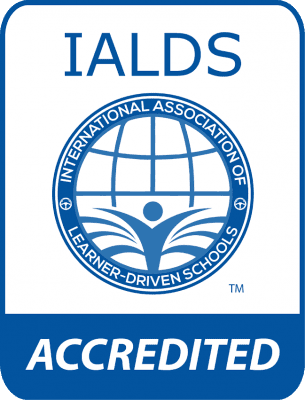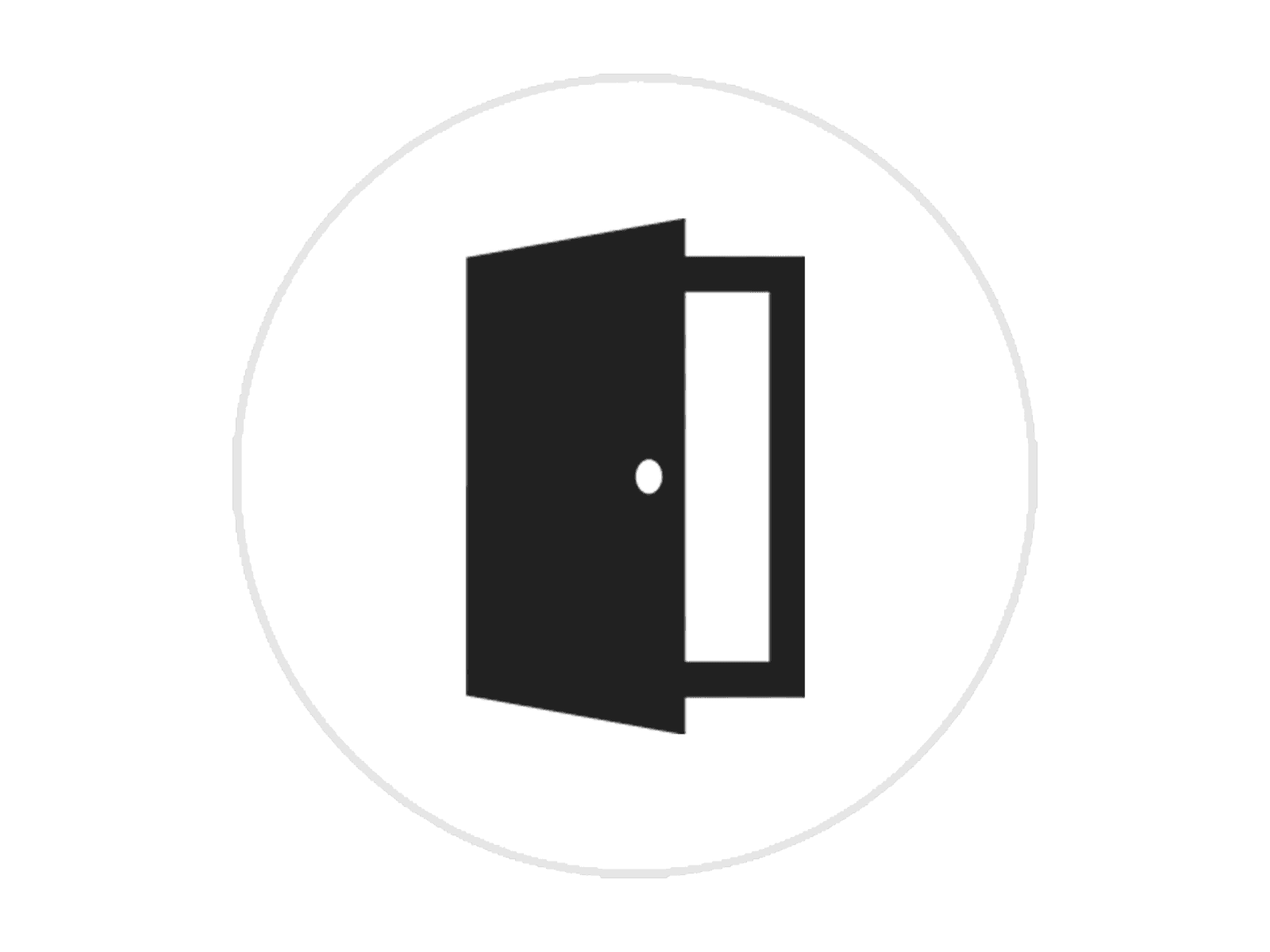FREQUENTLY ASKED QUESTIONS
THE WHAT
Acton Academy Northwest Austin (AANWA) is fundamentally different from traditional schools. No bells ring, and there are no lectures. Students are in control of their own learning.
Key Ways We Are Different:
Student-driven, self-paced learning
Real-world projects and apprenticeships
Multi-age/grade classes
Student self-governance
Exploration and assessment of skill levels, learning styles, aptitudes, personality traits, and interests
Guides rather than teachers
Socratic discussions rather than lectures
Mastery learning and student portfolios of achievements rather than grades
No homework. No teaching to the test
We respect and incorporate Maria Montessori’s philosophy for our younger studio but we are not a Montessori school. We have applied the best of Montessori methods: mixed-age classrooms, student-directed meaningful work, large blocks of work time, learning through “discovery,” and freedom of movement in the classroom. We believe it is possible to surpass this method by adding the following components: project-based learning, the Socratic Method of discussion and the latest in educational game-based software.
While we expose learners to the importance of mindfulness, AANWA is a non-sectarian learning environment. We value and respect each person’s beliefs. We explore the importance various religions have played throughout history but we do not promote any one religion.
AANWA's flexible approach to learning is a great fit for many kids who need something different than the traditional school environment. Students who have trouble sitting still through a standard school day can sometimes flourish in our classroom, which provides space for breaks, comfortable and flexible seating, and room for individual self-regulation.
However, schools that have adopted this learning model have noticed areas that provide challenges for the special needs student. Because this educational model is designed with curriculum that relies on independent learning and dynamic group projects along with an environment that can be very stimulating, students that struggle with cooperation, self-regulation, and sensory issues may have special challenges in our classroom. We are simply not equipped to serve children with some learning disabilities in Studio.

Great news! Our school is now an approved provider for the Texas Education Freedom Accounts (TEFA) Education Savings Account program.
This means eligible families can use their TEFA ESA funds to cover tuition and fees at our school.
At this time, we are in the process of finalizing our middle school (ages 11-14) and high school (ages 14-18) options, as our older students progress through the program. We want to make sure that when we launch offerings for these older learners, we are able to provide a rich, well-rounded experience!
Everyone develops at their own pace, so fostering a sense of curiosity and wonder in the world around them, making a habit of working letters and numbers into everyday conversation, and reading with them daily is often all they need...the rest is just, well...time and patience!
THE HOW
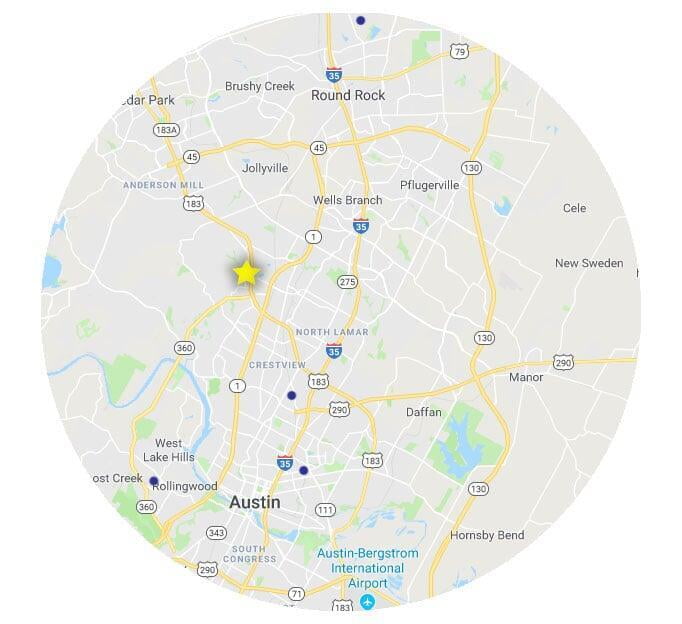
Launched in Fall 2020, our Spark (Lower Elementary, ages 4-7) and Discovery (Upper Elementary, ages 7-11) Studios are located in northwest Austin off of Old Spicewood Springs and 360 on 1 acre of wooded property.
We are currently in the process of finalizing our Middle School (ages 11-14) and High School (ages 14-18) options as our learners begin to level up out of our Discovery Studio. More to come soon!
We serve both Lower Elementary (Spark Studio, ages 4-7) and Upper Elementary (Discovery Studio, ages 7-11) learners and will soon have a Middle School and High School offering for our older learners.
We believe that children learn best when working with children younger and older than themselves rather than split up into groups based solely on age. In addition to individualized curriculum, all ages of students will work together in groups.
We operate on an eleven month calendar, but our flexible program allows families to travel together during the year, without sacrificing any learning.
Our year-round school schedule enables us to consider applications submitted at any time of the year. Our "rolling" enrollment process means once accepted, your learner can start at the beginning of any 6-week Session scheduled throughout the year.
Check out our simple, Family Application Process for more on how to apply and/or get on the Waitlist.
We measure student progress in several different ways:
We set Daily, Weekly, and Session goals between the students and the Guides.
We utilize robust real-time data for each of our online learning tools. At any given time both parents and Guides can find out exactly what your child is learning. It easily allows us to track progress, identify areas of struggle and close any learning gaps. Having a small class size, we are able to support each student to make sure that they can close learning gaps and master the skills they need to master.
The web-based programs don’t allow the student to move on to the next skill until it has been mastered.
We utilize individual portfolios where each student showcases and adds their best work. We can measure their growth in things such as Writer’s Workshops, and Quest projects, etc.
Though we never “teach to the test”, standardized tests are given once a year to ensure comprehensive progress.
RESULTS: Though ever learner is different, it is not uncommon for students attending Acton schools to eventually progress 2-3 grade levels above students their age.
Discovery (Upper Elementary) Studio:
Technology is a useful tool and we are excited for our students to learn how to use computers to access information, communicate effectively, and learn independently. Our students use their personal Chromebooks during some of their morning Core Skills time and for portions of their afternoon projects, which can typically add up to anywhere from 1.5 - 3 hours per day. A student-created Internet Use Policy ensures technology tools are used appropriately.
That said, you and your Eagle are empowered to plan non-tech alternatives for Core Skills work with the only requirement being that mastery checks are done via the online platform. Feel free to talk with us about it, if it’s a major concern.
Spark (Lower Elementary) Studio:
The students and families who have moved from schools with our format back to a traditional one have reported a relatively seamless transition.
Our students learn problem solving skills, respect for their peers, the how & why of rule formulation, perseverance, resilience and empathy. This is in addition to honing their skills of: focusing, listening, personal organization, setting their own goals, and management of their own time — all of which are a recipe for a good transition into any new environment.
Our promise at AANWA is to have our students well prepared for any selective university or college. Universities are changing so rapidly that it’s difficult to imagine what admission requirements will look like in ten years. Our Acton Eagles leave with a rich portfolio of work. For some elite schools, home school, and alternative school applicants with portfolios have far higher acceptance rates than traditional schools.
More importantly, with multiple apprenticeships, real-world experience, and excellent interpersonal skills, our Eagles will stand out from the traditional college prep crowd. We are aware of the use of standardized testing (like the SAT) and will ensure our heroes are well prepared for any exam taken.
Our students will be equipped to shine in the real world, whether they choose to go to college full-time, part-time or not at all.
FOUNDATIONS + PHILOSOPHY
Lord John Emerich Edward Dahlberg Acton (1834-1902) was a Victorian scholar of Freedom who saw liberty not as a license, but as the freedom to do what was right. He was suspicious of power for the sake of power, which led to his most famous quote: “Power tends to corrupt, and absolute power corrupts absolutely.” At the Acton Academy, we celebrate his defense of economic, political and religious freedom.
We believe that each of us has a special calling in life, and a series of trials and tests that must be faced with integrity and purpose, in order to live a satisfying and fulfilled life. Our mission is to prepare your child for his or her special journey.
These values are rooted in Joseph Campbell’s The Hero’s Journey, which has inspired the development of Acton’s curriculum. Students not only embark and reflect on their own journey filled with tests, allies, and enemies, but also examine how famous scientists, scholars, and historical figures heeded their own calls to adventure and roadblocks along the way.
When you look at the world as a hero, you welcome challenges, embrace responsibility, and act kindly towards others, all while being grateful for the opportunities that have come your way.
Someone who can research questions, follow instructions, solve problems—admit that they don’t know something and figure out a solution when they hit a roadblock without asking an adult for help — participate in discussions, and strive for mastery.
Mastery Learning is ensuring that a student has a complete understanding of a concept before they move on. An incomplete understanding early on can have devastating results later, especially in math.
Using the latest adaptive learning tools for core skills, our young learners progress at their own pace as they master each concept, moving quickly through topics they grasp easily and spending more time on those they find challenging. Children who comprehend a concept quickly can move on or deepen their understanding by helping those who are struggling. No one is just a learner, everyone is also a mentor, motivating each other to take ownership of their education.
We believe each of our students will find a passion — something they love and have a gift to do. They will use this gift to serve others and fulfill a need they are passionate about in the world.
This may be by becoming a father or mother who leads a family on a Hero’s Journey; it may be by becoming a coach who sees the light in a child’s eyes and guides him/her to pursue a dream; it may be by becoming a shoe-shiner who tells stories and makes people’s day just by doing his/her job with love and vigor; it may be by becoming an artist or writer who brings beauty to people’s lives; or it may be becoming an entrepreneur or business leader guided by compassion and integrity.
PROGRAM + LOGISTICS
| START DATE | ENROLLMENT DEADLINE | SESSION START |
| 9/3/24 | 8/20/24 | Session #1 |
| 10/14/24 | 9/30/24 | Session #2 |
| 12/2/24 | 11/18/24 | Session #3 |
| 1/9/25 | 12/21/24 | Session #4 |
| 2/24/25 | 2/10/25 | Session #5 |
| 4/14/25 | 3/31/25 | Session #6 |
| 5/27/25 | 5/13/25 | Session #7 |
| 9/2/25 | 8/19/25 | Session #1 |
History (know to our learners as “Civilization”) will be explored through longer, more in-dept Socratic discussions twice per week. We’ll also have blocks of time set aside specifically for Physical Development and Art twice per week in addition to integrative Quests that will provide lots of opportunities to explore the arts and other extracurricular areas of interest.
We also have a no homework policy so that our learners have more time to spend pursuing individual interests, hobbies and passions outside of the Studio.
If you are looking for a program with a large, extensive in-school sports program, language-immersion or band/orchestra program, we are likely not (and will never be) a fit for your family!
Acton Academy Northwest Austin follows an 11 month calendar (September through July) that allows for students to have extended breaks throughout the year and maintains their interest and retention across 7 (5-6 week long) sessions. Here’s a link to our School Calendar as an example.
We have a one-time $1,000 Enrollment Fee to secure your spot. As of 8/1/24. our Standard Tuition is $1,350/month for 11 months. Note that for all learners enrolled after 6/1/21, a COLA will be applied to the Standard Tuition rate each year.
Availability: We have a few spots available, as we’ve limited spots this year, they are filling up quickly. We make enrollment decisions primarily based on philosophical fit, cultural fit and learner readiness. Gender and age may also impact our decisions, as maintaining a diverse and balanced community is an important aspect of the learning environment we are building.
Waiting Pool (aka Waiting List): If, after completing the audition process, if we all agree that AANWA would be a great fit for your family, if we do not yet have a spot available for your learner, we’ll place them in our Waiting Pool. When a spot does come available, and we’ll notify you of the opening and invite you to enroll.
CURRICULUM + PHILOSOPHY
TEACHERS Socratic Guides:
It is important to understand that in a learner-driven environment like Acton, there is no direct instruction from Guides. Here's a great excerpt from the original Acton campus' blog on that topic if you want more insight.
GRADES Badges that demonstrate Mastery:
Here's a very quick high-level view of how it all fits together. Rather than grades, because we utilized the latest, game-based learning platforms (like Khan Academy, DreamBox, IXL, Lexia, etc.), you'll be able to see, real-time, what specific skills your learner is currently working on or has mastered, along with their progress towards completing their Badge Plan.
HOMEWORK Time to nurture relationships, hobbies, interests and passions:
We have a no homework policy. We'd rather our learners have time to relax, recharge, spend quality time with their families and/or more deeply pursue other interests/passions. Now, should your learner choose to work on projects outside of the Studio that would be up to them of course!
At AANWA, we like to call that "learning untethered". A learner-driven environment means that your child will be free to pursue skills mastery at their own pace and the Guides (known as teachers in a more traditional setting) will not serve as a bottleneck to keep everyone contained on the same state-prescribed learning track and timeline.
Not only will your child have the opportunity to expand and deepen their learning experience through mentoring (and being mentored by) a mixed age group of learners, they are free to pursue mastery at whatever pace makes most sense (with your support and encouragement as parents, of course). WARNING: This can be unnerving for some parents that want to see a smooth, even progression achievement. ;-)
Our Learning Design (aka Curriculum) is broken down into a series of Badges that (very!) roughly correlate to grade levels. Here's a video with a full explanation.

EXAMPLE BADGE PLAN:
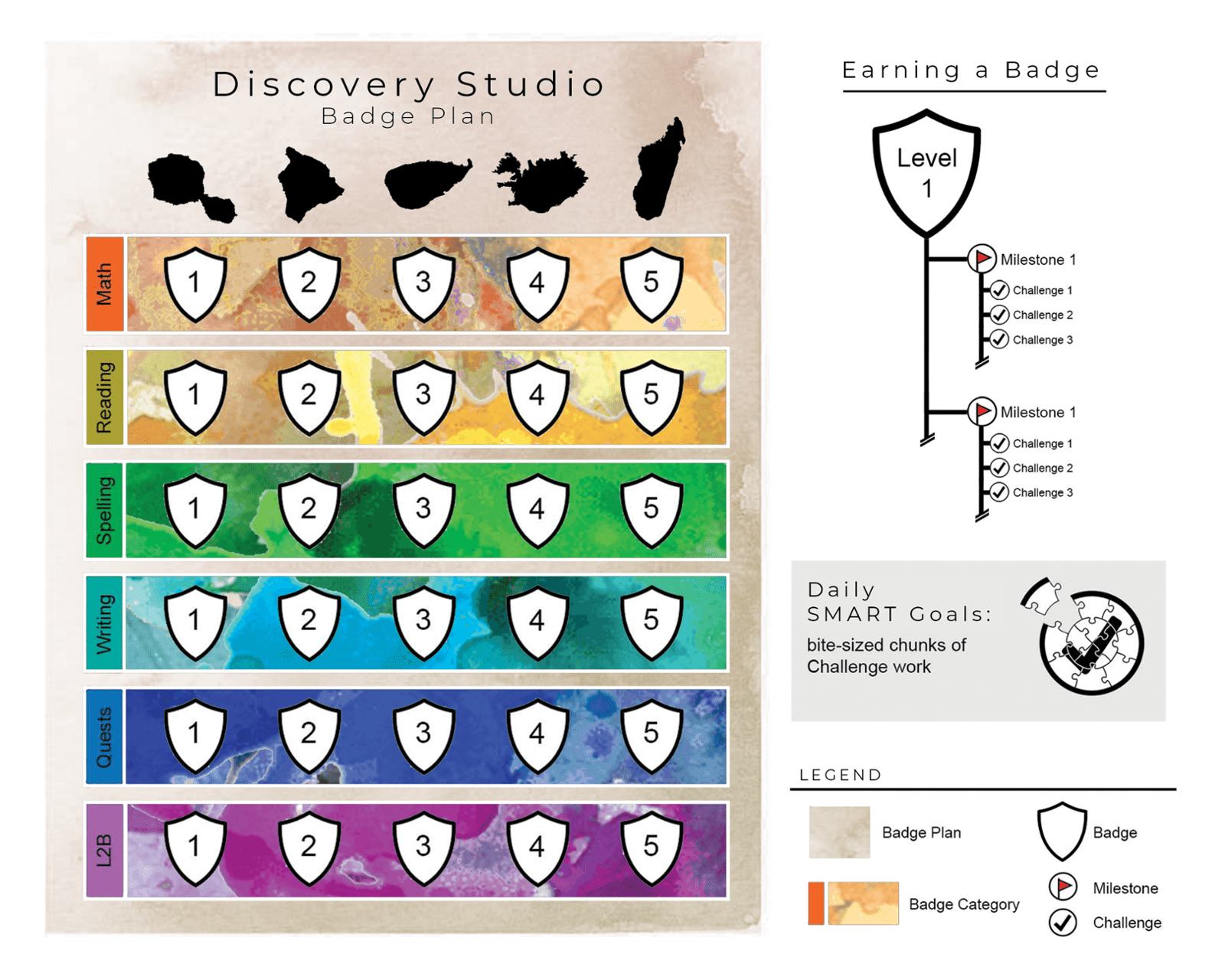
EXAMPLE JOURNEY MAP:
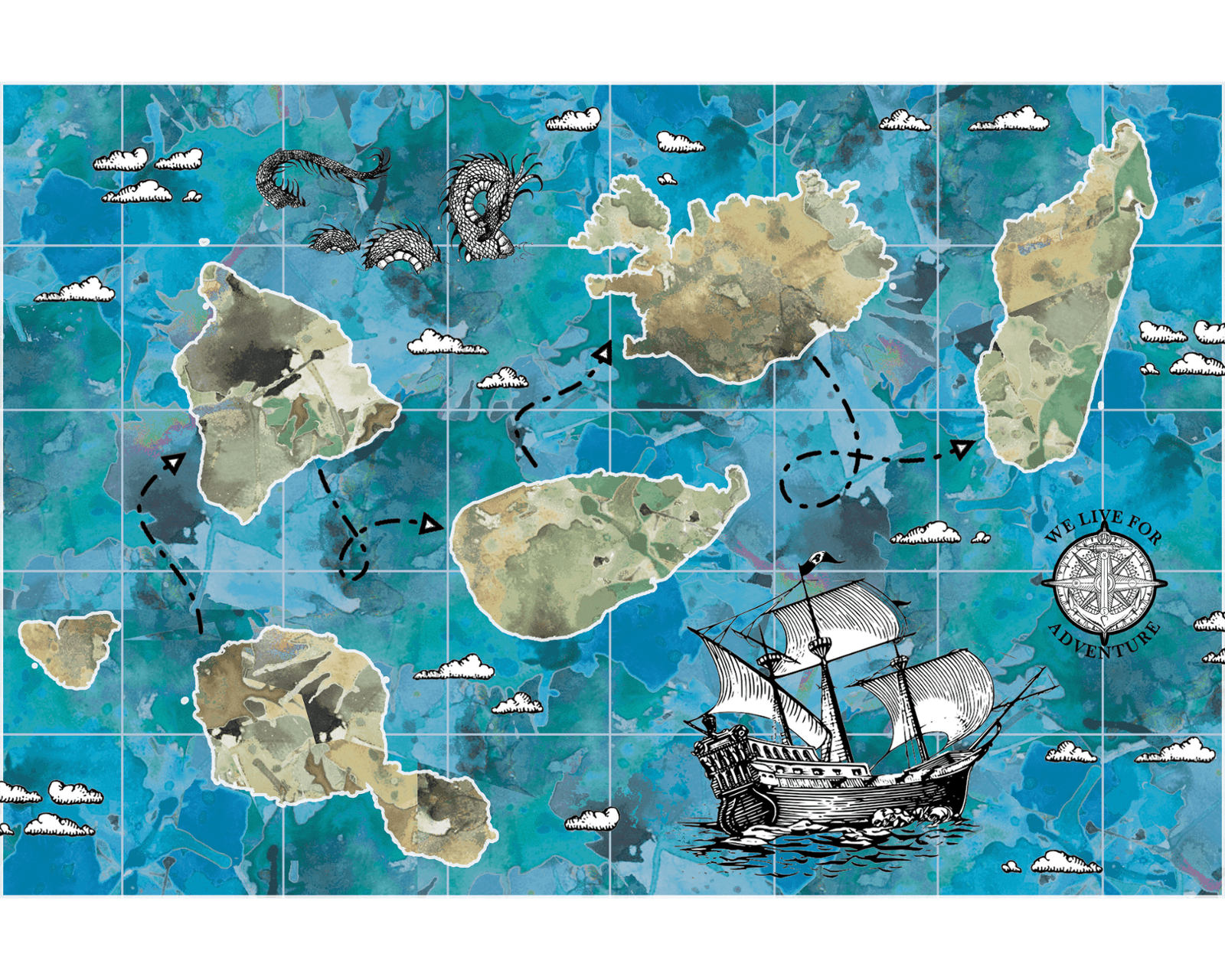

Once a learner has completed all levels of all Badges, they are able to "level up" to the next Studio.
Learners are free to accelerate through the Studio Badge Plan in whatever pace and manner they choose with the end goal always the same - to eventually earn all the Badges in the Studio Badge Plan so they can advance to the next Studio.
Here's a video with additional details.
After understanding more about how our curriculum is structured, many parents then wonder what happens when a learner chooses to focus on one area that they really love (like say Reading), to the detriment of other areas (like Math). The truth is, deep, transformative learning tends to be uneven - it's rarely a smooth progression across all areas at the same pace, so as an Acton Parent, you will most certainly face some unnerving moments in this respect.
That said, there are a few things baked in to our approach that encourage learners to (eventually) choose to pursue a more well-rounded skill set:
Gamification of Curriculum
Moving along the Journey Map requires work in all Core Skills subject areas like Math, Reading, Writing and Spelling.
Peer Accountability
Learners have a "running squad" that helps keep them accountable for progress towards learning goals and commitments. Learners cannot "level up" to the next Studio without having completed badge requirements in all areas of study.
Integrative Quests
Often, the motivation for acquiring new skills can come from the desire to tackle learning challenges presented in the Quest format.
Schedule
Focused work sprints may be baked into the Daily Schedule from time to time - "DEAR Time" (Drop Everything And Read), or "Math Power Hour" (everyone works on math goals only for 1 hour) are great examples of this.
What makes AANWA unique is our emphasis on self-directed learning. In creating a community of self-directed learners, these are some of the things we “look-for” before inviting young learners to join our community. These are essential prerequisites that indicate our learning environment may be a good fit for your child.
SPARK (ages 4-7)
- Exhibits a positive attitude about learning in general
- Participates willingly in classroom activities
- Follows simple oral directions
- Actively engages in their own learning and is generally curious
- Displays the following social and emotional skills most of the time.
- Makes friends and plays cooperatively
- Shows empathy
- Manages strong feelings like frustration and disappointment without becoming aggressive or withdrawn
- Separates from parent without distress
- Engages in an activity for at least 15 minutes
- Possesses basic communication skills
- Is physically self-reliant
- Is able to care for studio materials and contribute to cleaning the physical space
DISCOVERY (ages 7-11)
- Reading fluently.
- Follow basic written and oral instructions.
- Able to engage and participate in a 15-minute discussion with peers.
- Can set, remember, and pursue a goal for 30 minutes or more.
- Works well with peers by respecting their space and goals.
- Takes responsibility for actions and choices
- Can operate a laptop
- Finished Spark Badge Plan and is prepared for a more academically-challenging environment
PATHFINDER (ages 11-14)
Positive attitude about learning in general
Takes responsibility for learning and problem-solving on their own
Self-advocates
Follows complex written and oral directions
Displays the following social and emotional skills nearly all of the time.
Makes friends and cooperates with others
Shows empathy
Manages strong feelings like frustration and disappointment without becoming aggressive or withdrawn
Willingness to help others and demonstrates leadership
Can set, remember, and pursue a goal for 45+ minutes
Takes care of studio and personal space with organization skills
Participates often in Socratic Discussions with strong arguments
Finished the Discovery Badge Plan and is prepared for a more academically-challenging environment
This is a question many parents have, especially when it comes to considering a more non-traditional approach, like AANWA. The short answer is, nothing.
Now for the longer answer:
First, as a parent it is your right and responsibility to decide how best to support your learner - this may look like boundaries or incentives for meeting (or not meeting) learning goals. It may look like after-school tutoring or extra-curricular exploration. Again, we respect these choices as parenting decisions and encourage you to forge whatever social contracts you deem appropriate with your learner outside of the Studio.
With Spark Learners (ages 4-7): We have a badge plan full of challenges that will help them be equipped to thrive in the Discovery Studio. Badge Plan categories include Leadership, Communication, Safety, Writing, Reading and Math. At the end of the day, we are also looking for the ability to independently read simple Challenges and focus on a simple goal for at least 30 minutes - typically this occurs at some point after someone turns 7 yo - it varies :-) See our list of Look-Fors for more details.
With Discovery Learners (ages 7-11) State-prescribed math and language arts benchmarks don't really even come into play until Discovery, where they begin working in the latest game-based learning platforms like Khan Academy, IXL, DreamBox, Lexia, etc. These platforms are designed to help pinpoint mastery in specific skills and reveal skills they still need to practice. Because they serve so many learners in the public school system, they are also designed with state standards in mind. This means that it's relatively easy to "map" where they are at to a typical "grade level".
At our school, we don't do this - there is no real emphasis on matching grade level to age. What we want to see is 1) What are your learning goals? 2) Are you working hard? 3) Are you making progress towards your goals? When looking through this lens, at AANWA "behind" means you aren't on track with your individual goals... and therefore need to put in more effort or need extra help (if there is a learning disability involved, for instance).
Think of a Studio as the classroom of a one-room school house. We like to think of it as a learning "habitat" for learners of multiple ages and skill levels where they can work for focused period of individual flow or purposeful collaboration.
At AANWA, so far we have built 2 such “habitats”: our Spark Studio (Lower Elementary, ages 4-7) and our Discovery Studio (Upper Elementary, ages 7-11). Eventually, as our oldest learners age out, the plan is to launch a middle school and a high school studio as well!
A Badge is something that a learner can earn after they complete a series of learning challenges that demonstrate mastery in something. Here's a video with additional details.
“Core Skills” refers to the foundational skills of Reading, Writing and Math. We set aside time each day in our Daily Schedule setting SMART Goals to focus on tackling challenges and earning Badges in each of these areas.
At AANWA we rely on the latest, game-based learning platforms to empower our learners on their self-paced journey to mastery.

A Launch is a 15-minute Socratic discussion designed to help inspire, equip and focus Eagles for a work sprint – a focused period of individual flow or purposeful collaboration.
During a typical day in an Acton Academy, these will occur 2x per day (Morning Launch, Afternoon Launch) with a similar Closing Discussion at the end of the day that invites reflection on the day and renewed purpose and commitment for the next.
Once the studio culture and systems are more established, it will not be uncommon to see many of these discussions prepared, delivered and facilitated by the learners themselves.
We’re dead serious about this but understand that further explanation is helpful. First, the true definition of the word “genius”: exceptional intellectual or creative power or other natural ability.
Does this mean sky-high IQ? No. (Which by the way is a largely incomplete and unhelpful measurement anyways!) Is this really just code for “everyone deserves a trophy for being a unique and beautiful snowflake”? Nope. Uniqueness, while potentially valuable, does not replace mastery, excellence, competence or character.
Believing that every child is a genius simply means that we believe each person who walks through our doors has a special gift (or two!) that can change the world in a profound way. Our main goal is to help equip them to discover and cultivate their gifts.
AANWA's flexible approach to learning is a great fit for many kids who need something different than the traditional school environment. Students who have trouble sitting still through a standard school day can sometimes flourish in our classroom, which provides space for breaks, comfortable and flexible seating, and room for individual self-regulation.
However, schools that have adopted this learning model have noticed areas that provide challenges for the special needs student. Because this educational model is designed with curriculum that relies on independent learning and dynamic group projects along with an environment that can be very stimulating, students that struggle with cooperation, self-regulation, and sensory issues may have special challenges in our classroom. We are simply not equipped to serve children with some learning disabilities in Studio.
Each Studio is built on a foundational Studio Contract, created and agreed to by the learners.
At AANWA, choosing to keep the Contract promises is interpreted as a choice to stay and choosing to break Contract promises is interpreted as a choice to leave - either way, we will respect the learner's choice.
Additional Questions?
If you have any additional questions, don't hesitate to reach out!
HELPFUL RESOURCES

HIDDEN - PODCAST
Visit our comprehensive resources page and jump into learning!

HIDDEN - BLOG
Visit our comprehensive resources page and jump into learning!
VIDEOS
Explore our recommended videos to dive into the inspiration behind Acton Academy's unique approach to education, featuring powerful insights on self-directed learning, resilience, and fostering a love for discovery.
BOOKS
Discover our curated list of recommended reading books to inspire learning, growth, and meaningful conversations. Explore titles that will help you nurture resilience, creativity, and a lifelong love of learning in your family!
NEXT STEPS
FAMILY APPLICATION PROCESS
Ready to take the next step? Learn more about our simple, thoughtful application process and start your journey toward joining our community of lifelong learners.

